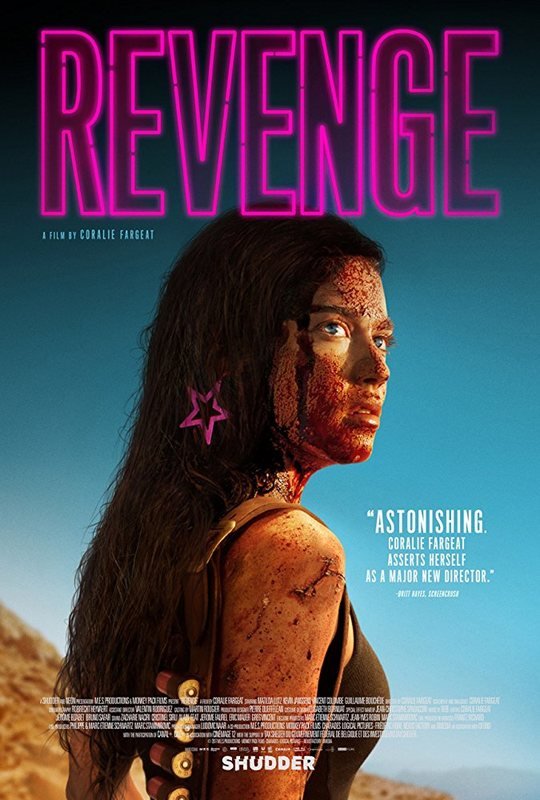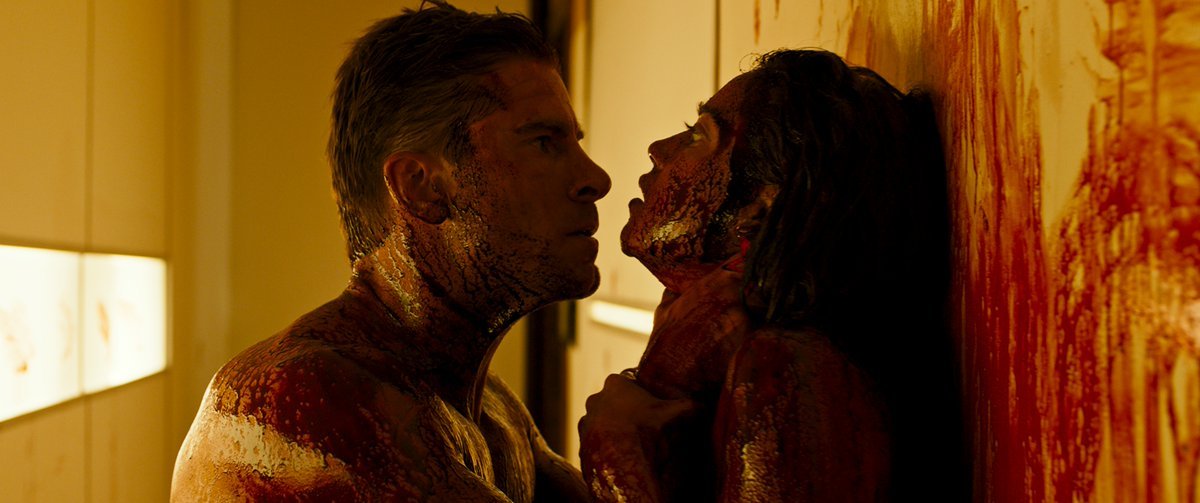REVENGE (2017): A Subversive Rebirth For The Rape-Revenge Genre
Exploitation cinema can be art. Like any dramatic form, the magic lies in what the artist brings to it. Even a controversial cinema archetype like the "rape-revenge" movie can transcend its lurid elements if the proper artistry is applied: classic examples include films as diverse as The Virgin Spring and Ms. 45. The latest film to successfully reinterpret the rape-revenge subgenre is Revenge, the feature film debut for French filmmaker Coralie Fargeat. Like the aforementioned classics, it uses carefully deployed visceral subject matter to confront the attitudes and beliefs of the audience.The plot of Revenge is elemental in its simplicity: Jen (Matilda Lutz) is the young mistress of well-to-do businessman Richard (Kevin Janssens). Their latest tryst unfortunately coincides with a hunting weekend that involves his friends Stan (Vincent Colombe) and Dimitre (Guillaume Bochede). The pals arrive too early and jealous Stan rapes Jen while Richard is off on business. When Richard returns, he tries to bribe her into silence and threatens more violence if she doesn't comply. She runs into the nearby desert wilderness, kicking off a chain of events that brings bloodshed, death and catharsis, the latter element for both the heroine and the viewers. Revenge is an impressive film because it manages to simultaneously fulfill and subvert genre expectations. Exploitation fans will be happy to know that it is as unflinchingly brutal and bloody as any other example of the rape-revenge film. There are impalements, stabbings and shootings, the majority enacted with old school prosthetic effects. Memorable moments of carnage include a wound treatment scene that seems to pay homage to Rambo III, a scene with a piece of glass painfully extracted from a foot that plays like a Lucio Fulci setpiece and a finale that literally paints a white-themed main room red with several pints of blood.However, the surface thrills merely act as a delivery vehicle for what is really going in Revenge. Fargeat both wrote and directed and has fun playing with the traditionally masculine approach of this subgenre. The first twenty minutes of the film take the male attitude, with the camera ogling Jen as she knowingly plays to her male audience, but once the men turn on her that tactic ends.From there on, the men descend into barbarism or cowardice (in a pointed touch, rapist Stan is revealed to be the weakest of the men) while the beaten and wounded Jen experiences a sort of nature-assisted rebirth, complete with a peyote-fueled vision as she takes care of a wound. Even the brutal finale has elements of genre-deconstructing satire: the best bit might be when one character accidentally reveals their location during a standoff when the blood from a wound flows into sight out from their hiding place.
Revenge is an impressive film because it manages to simultaneously fulfill and subvert genre expectations. Exploitation fans will be happy to know that it is as unflinchingly brutal and bloody as any other example of the rape-revenge film. There are impalements, stabbings and shootings, the majority enacted with old school prosthetic effects. Memorable moments of carnage include a wound treatment scene that seems to pay homage to Rambo III, a scene with a piece of glass painfully extracted from a foot that plays like a Lucio Fulci setpiece and a finale that literally paints a white-themed main room red with several pints of blood.However, the surface thrills merely act as a delivery vehicle for what is really going in Revenge. Fargeat both wrote and directed and has fun playing with the traditionally masculine approach of this subgenre. The first twenty minutes of the film take the male attitude, with the camera ogling Jen as she knowingly plays to her male audience, but once the men turn on her that tactic ends.From there on, the men descend into barbarism or cowardice (in a pointed touch, rapist Stan is revealed to be the weakest of the men) while the beaten and wounded Jen experiences a sort of nature-assisted rebirth, complete with a peyote-fueled vision as she takes care of a wound. Even the brutal finale has elements of genre-deconstructing satire: the best bit might be when one character accidentally reveals their location during a standoff when the blood from a wound flows into sight out from their hiding place. Best of all, this take on a b-movie genre has an a-movie sense of craft. The ensembles performance's are strong: Lutz does impressive work in a physically demanding role as avenging angel while Janssens surprises by uncovering hidden depths of Darwinesque cruelty under a pleasant surface and Colombe makes a fun-to-hate cowardly bad guy. Fargeat directs with a tightly-controlled sense of economy, going for an arid style to match the location that is enhanced by a pulsating electronic score and striking cinematography by Robrecht Heyvaert. When the action comes, her ability to choreography action and bloodletting is as strong as any male director you care to mention.In short, Revenge is the rare foreign film that delivers for both the arthouse crowd and the exploitation crowd. Having one's cake and eating it too is seldom the bloody good fun this movie provides.
Best of all, this take on a b-movie genre has an a-movie sense of craft. The ensembles performance's are strong: Lutz does impressive work in a physically demanding role as avenging angel while Janssens surprises by uncovering hidden depths of Darwinesque cruelty under a pleasant surface and Colombe makes a fun-to-hate cowardly bad guy. Fargeat directs with a tightly-controlled sense of economy, going for an arid style to match the location that is enhanced by a pulsating electronic score and striking cinematography by Robrecht Heyvaert. When the action comes, her ability to choreography action and bloodletting is as strong as any male director you care to mention.In short, Revenge is the rare foreign film that delivers for both the arthouse crowd and the exploitation crowd. Having one's cake and eating it too is seldom the bloody good fun this movie provides.


